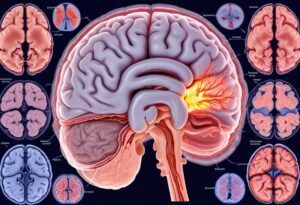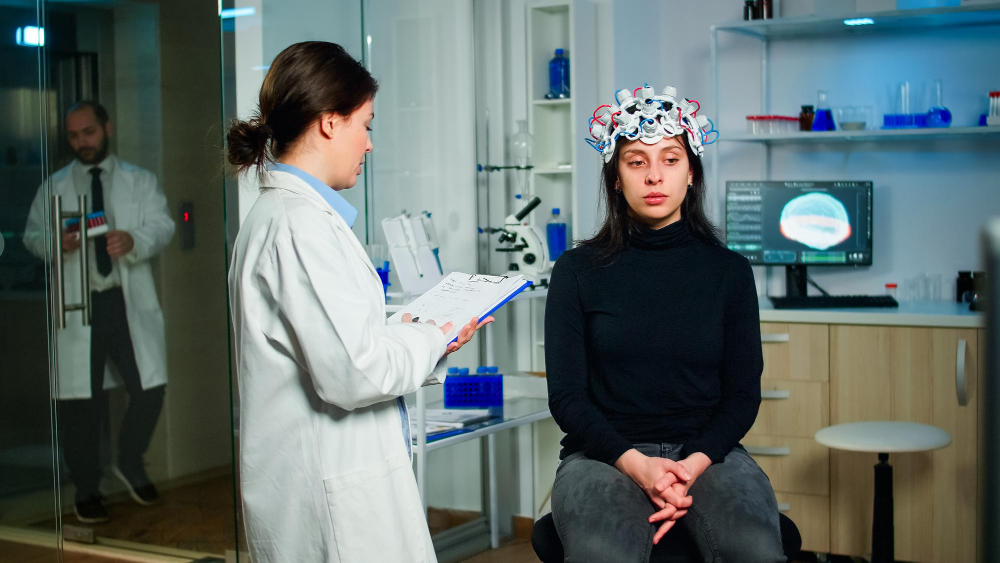Introduction
Brain cancer, a devastating diagnosis, presents a formidable challenge to patients and their loved ones. However, amidst the complexities of this disease, there is hope. In India, advanced medical facilities and a cadre of skilled healthcare professionals stand ready to combat brain cancer with cutting-edge treatments and compassionate care.
Let’s explore the landscape of Brain Cancer Treatment in India and discover how patients can find solace and support on their journey towards healing.
Brain Cancer Symptoms
Brain cancer symptoms can vary widely depending on the location, size, and type of tumour, as well as individual factors such as age and overall health. Some common symptoms of brain cancer include:
- Headaches: Persistent or severe headaches, especially those that worsen in the morning or with changes in position, are a common symptom of brain tumours.
- Seizures: Seizures, which may be focal (affecting one part of the body) or generalized, can occur in individuals with brain cancer.
- Nausea and vomiting: These symptoms may occur due to increased pressure within the skull caused by the tumour.
- Changes in vision: Blurred vision, double vision, or loss of peripheral vision may occur if the tumour affects the optic nerves or visual pathways.
- Weakness or numbness: Weakness or numbness in one side of the body, often accompanied by difficulty walking or balancing, can occur if the tumour affects the motor pathways in the brain.
- Changes in mental status: Brain tumours can cause changes in cognitive function, including memory loss, confusion, personality changes, or difficulty concentrating.
- Speech difficulties: Difficulty speaking, slurred speech, or trouble understanding language can occur if the tumour affects areas of the brain involved in speech and language.
- Changes in mood or behaviour: Irritability, mood swings, or depression may occur as a result of the tumour’s effects on brain function.
- Coordination problems: Lack of coordination, clumsiness, or difficulty performing tasks that require fine motor skills may occur if the tumour affects areas of the brain responsible for movement and coordination.
- Fatigue: Persistent fatigue or weakness unrelated to other factors may occur as a result of the body’s response to the tumour.
It’s important to note that these symptoms can also be caused by conditions other than brain cancer. However, if you experience any of these symptoms persistently or if they worsen over time, it’s essential to consult a healthcare professional for proper evaluation and diagnosis. Early detection and treatment can significantly improve outcomes for individuals with brain cancer.
Causes of Brain Cancer
- Genetic Factors: Some individuals may have a genetic predisposition to develop brain cancer. Certain genetic conditions, such as neurofibromatosis, Li-Fraumeni syndrome, and tuberous sclerosis, increase the risk of developing brain tumours.
- Exposure to Radiation: Exposure to ionizing radiation, either from medical treatments (such as radiation therapy for previous cancers) or environmental sources (such as radiation from nuclear fallout), can increase the risk of developing brain cancer.
- Environmental Factors: Some environmental factors, such as exposure to certain chemicals or toxins, may contribute to the development of brain cancer. However, the specific causal relationships are not always well-established.
- Immune System Disorders: Individuals with weakened immune systems, such as those with HIV/AIDS or undergoing immunosuppressive therapy following organ transplantation, may have an increased risk of developing certain types of brain cancer.
- Age and Gender: Brain cancer can occur at any age, but certain types are more common in specific age groups. Additionally, some types of brain cancer are more prevalent in men than in women.
Types of Brain Cancer

- Gliomas: Gliomas are tumours that originate in the glial cells of the brain, which provide support and protection to nerve cells. This category includes astrocytomas, oligodendrogliomas, and ependymomas.
- Meningiomas: Meningiomas arise from the meninges, the protective membranes that cover the brain and spinal cord. These tumours are typically benign but can cause symptoms if they grow large enough to exert pressure on surrounding brain tissue.
- Medulloblastomas: Medulloblastomas are a type of brain cancer that primarily affects children. These tumours develop in the cerebellum, the part of the brain responsible for coordination and balance.
- Pituitary tumours: Pituitary tumours originate in the pituitary gland, a small gland located at the base of the brain. These tumours can disrupt hormone production and cause a variety of symptoms depending on their size and location.
- Primary Central Nervous System (CNS) Lymphomas: These are cancers that originate in the lymphocytes, a type of white blood cell, within the brain or spinal cord. Primary CNS lymphomas are relatively rare but can occur in individuals with weakened immune systems.
- Metastatic Brain tumours: Metastatic brain tumours, also known as secondary brain tumours, occur when cancer cells from tumours elsewhere in the body spread to the brain. Common primary sites of metastasis include the lungs, breasts, colon, and skin (melanoma).
Different Grades of Brain Cancer
Grade I: Grade I brain tumours are the least aggressive and are characterized by slow-growing cells that closely resemble normal brain cells. These tumours are often considered benign and may be curable with surgery alone. Examples include pilocytic astrocytomas and meningiomas.
Grade II: Grade II brain tumours are slightly more aggressive than Grade I tumours and may grow more quickly. The cells appear somewhat abnormal under a microscope and may infiltrate surrounding brain tissue. Treatment typically involves surgery to remove as much of the tumour as possible, followed by radiation therapy or chemotherapy. Examples include diffuse astrocytomas and oligodendrogliomas.
Grade III: Grade III brain tumours are considered malignant and have a higher likelihood of spreading to nearby tissues. The cells appear more abnormal under a microscope and grow more rapidly than Grade II tumours. Treatment usually involves a combination of surgery, radiation therapy, and chemotherapy. Examples include anaplastic astrocytomas and anaplastic oligodendrogliomas.
Grade IV: Grade IV brain tumours are the most aggressive and are characterized by rapidly dividing cells that invade surrounding brain tissue. These tumours are highly malignant and have a poor prognosis. Treatment typically involves surgery, followed by aggressive radiation therapy and chemotherapy. Examples include glioblastomas, which are the most common and deadliest type of primary brain tumour in adults.
Brain Cancer Treatment Options
- Surgery: Surgical removal of the tumour is often the first-line treatment for brain cancer, especially if the tumour is accessible and can be safely removed without causing significant damage to surrounding brain tissue.
- Radiation Therapy: Radiation therapy uses high-energy X-rays or other forms of radiation to destroy cancer cells or prevent them from growing. It may be used alone or in combination with surgery and/or chemotherapy.
- Chemotherapy: Chemotherapy involves the use of drugs to kill cancer cells or prevent them from multiplying. It may be administered orally or intravenously and can be used as a primary treatment or in combination with surgery and/or radiation therapy.
- Targeted Therapy: Targeted therapy uses drugs or other substances to specifically target cancer cells while minimizing damage to normal cells. It may be used in cases where the tumour has specific genetic mutations or biomarkers.
- Immunotherapy: Immunotherapy works by harnessing the body’s immune system to recognize and attack cancer cells. It may be used alone or in combination with other treatments to enhance the immune response against the tumour.
- Supportive Care: Supportive care, also known as palliative care, focuses on managing symptoms, improving quality of life, and providing emotional support for patients and their families. It may include pain management, symptom relief, nutritional support, and psychosocial support services.
Side Effects of Brain Cancer Treatment
- Fatigue: Fatigue is a common side effect of brain cancer treatment, including surgery, radiation therapy, chemotherapy, and targeted therapy. It can affect daily activities and may persist for several weeks or months after treatment.
- Hair Loss: Chemotherapy and radiation therapy can cause hair loss, including scalp hair, eyebrows, and eyelashes. Hair loss is usually temporary and may grow back once treatment is completed.
- Nausea and Vomiting: Chemotherapy and radiation therapy can cause nausea and vomiting, which can be managed with anti-nausea medications and dietary changes.
- Cognitive Changes: Brain cancer treatment, particularly radiation therapy, can cause cognitive changes such as memory problems, difficulty concentrating, and changes in mood or behaviour. These effects may improve over time but can persist in some cases.
- Weakness and Motor Impairment: Surgery and radiation therapy may cause weakness or motor impairment, depending on the location of the tumour and the extent of treatment. Physical therapy and rehabilitation may be helpful in restoring strength and function.
- Risk of Infection: Chemotherapy and immunotherapy can weaken the immune system, increasing the risk of infection. Patients should take precautions to avoid exposure to infectious agents and follow their healthcare provider’s recommendations for infection prevention.
- Other Side Effects: Other side effects of brain cancer treatment may include loss of appetite, changes in taste or smell, skin reactions, and emotional distress. It’s essential for patients to communicate any side effects to their healthcare team so that appropriate supportive care measures can be implemented.
List of Best Hospitals For Cancer Treatment
Max Super Speciality Hospital, New Delhi
Max Healthcare is at the forefront of neuro-oncology, providing comprehensive care with a multidisciplinary approach. They utilize advanced techniques like Stereotactic Radiosurgery (SRS) and neuro-navigation systems, which allow for precise tumour targeting with minimal impact on healthy tissue.
Apollo Hospitals, Chennai
Known for their pioneering work in cancer care, Apollo offers state-of-the-art diagnostic services including PET-CT scans and advanced MRI imaging. Their treatment protocols integrate chemotherapy, radiation therapy, and innovative surgical methods to manage and treat brain tumours effectively.
Fortis Hospital, Bangalore
Fortis excels in neuro-oncology with facilities for complex neurosurgical procedures, using technology such as 3D conformal radiation therapy and intensity-modulated radiation therapy (IMRT) to ensure precision and effectiveness.
Tata Memorial Hospital, Mumbai
A leader in cancer treatment and research, Tata Memorial provides specialized care for brain cancer patients through their expert team of oncologists and surgeons. The hospital is equipped with cutting-edge technology for neuro-imaging and radiotherapy.
Medanta The Medicity, Gurgaon
Medanta’s Neurosciences and Oncology departments collaborate to offer integrated care. They use minimally invasive surgery, Gamma Knife radiosurgery, and advanced chemotherapy protocols as part of their treatment regimen.
Kokilaben Dhirubhai Ambani Hospital, Mumbai
This hospital is known for its comprehensive cancer care and uses the latest innovations like the Novalis Tx for radiosurgery, providing high precision treatment for brain tumours.
Artemis Hospital, Gurgaon
Artemis employs a multidisciplinary approach with a focus on tailored treatment plans that include the latest in molecular diagnostics and targeted therapy.
Manipal Hospital, Bangalore
Manipal Hospital is renowned for its skilled neurosurgery team and state-of-the-art facilities, offering treatments that include neuro-endoscopic surgeries for less invasive approaches to brain tumour removal.
Conclusion
With its advanced healthcare infrastructure, India is an excellent choice for brain cancer treatment. The country’s top hospitals are equipped with the latest technology and are staffed by specialists who are skilled in the latest oncological techniques. For international patients, navigating this landscape can be challenging without local knowledge and logistical support.
DocTrePat specializes in assisting such patients by facilitating access to the best medical treatments available in India. Through partnerships with leading hospitals, DocTrePat ensures that international patients receive not only top-tier medical care but also personalized support throughout their treatment journey. Whether it’s coordinating hospital visits, arranging accommodation, or providing interpretation services, DocTrePat makes the process seamless and stress-free. This commitment to quality and patient care makes India, in conjunction with DocTrePat, a favoured destination for those seeking effective and affordable brain cancer treatment.

